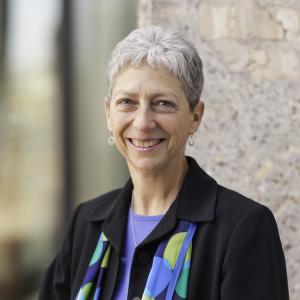
Kate Wolford
Coming from a rural background, Kate Wolford was drawn to study abroad as a way to broaden her horizon. Once in London, Kate made the most of her semester exploring history, diverse neighborhoods, and even took up volunteering with a Member of the British Parliament. In class, Kate honed her skills in policy and economic analysis that have proved useful throughout her career in the nonprofit sector. After working on humanitarian efforts in Latin America early in her career, Kate went on to work at Lutheran World Relief, where she spent 13 years as president of the global grantmaking and advocacy organization. Since 2006, Kate has served as president of The McKnight Foundation, a Minnesota-based family foundation. In addition to overseeing the Foundation’s assets of $2.2 billion, Kate has led their sustainability efforts and implemented an innovative impact investing program that has become a role model for others in the field. In our interview, Kate reflects on her experience in London and shares why having a global perspective continues to be instrumental for her work today.
IES Abroad: Why did you decide to study abroad and what drew you to London?
Kate Wolford: I grew up and went to college in rural areas; I wanted and needed to broaden my horizon. During my sophomore year I read these lines penned by writer Samuel Johnson, "When a man is tired of London, he is tired of life; for there is in London all that life can afford." I suppose I wanted to see if that would ring true for me two hundred years later!
IES Abroad: What are one or two of the most influential memories from your time studying in London?
KW: While studying abroad, I had the opportunity to volunteer with a Member of the British Parliament. Doing research for the MP as well as meeting his constituents gave me a unique vantage point and appreciation for a different form of government. It was instructive to hear how U.S. history and politics were viewed from the other side of the Atlantic. I loved exploring the history, theater, and diverse neighborhoods of the city and interacting with students from colleges from across the U.S.
IES Abroad: Were there any lessons learned that have remained a constant throughout your life?
KW: Bring respectful curiosity when entering into other cultures and communities; and be willing to be challenged, enriched, and transformed in the process.
IES Abroad: You spent much of your early career in Latin America and the Caribbean working for faith-based social service organizations. What inspired you pursue this type of mission-driven work and in what ways did studying in London help prepare you to work abroad?
KW: I was blessed to work in program, policy, and administrative roles in organizations that put faith into action for peace, justice and the dignity of all human beings and creation. My studies in London honed my skills in policy and economic analysis in ways that were useful for my subsequent professional duties.
IES Abroad: Since 2006, you have been president of The McKnight Foundation, one of the nation’s largest family foundations anchored in one state, and oversee around $2.2 billion in assets. What drew you to the Foundation?
KW: I was drawn to McKnight by its approach to philanthropy and the opportunity to work on some of the most pressing societal issues of our day. A major focus of our work is accelerating the transition to a low carbon economy, which is key to the future health of our global community and the planet on which we depend.
IES Abroad: In 2014, The McKnight Foundation launched an innovative Impact Investing Program dedicating $200 million, about 10%, of its endowment assets. An additional $100 million has since been allocated. What does the Foundation aim to achieve with this program?
KW: Private foundations are legally required to distribute 5% of their resources each year toward charitable purposes. Approximately 95% is invested in the market—through impact investing, we are aligning more of our investments with our mission; for example, in climate solutions, conservation, and affordable housing for low income families. In this way, we can provide more societal benefits with our resources.
IES Abroad: Although the Foundation’s work is primarily focused on Minnesota, significant support is also directed to strategies across the U.S. and in Africa, Southeast Asia, and Latin America. How important has having an international perspective been throughout your career?
KW: It has been the common thread throughout my career. I knew McKnight because I led one of its grantee organizations, LWR. In addition to its international work, I was attracted to Minnesota-based McKnight because of the growing diversity of the state’s population. Minnesota is home to some of the world's largest diaspora communities, including Hmong, Somali, and Karen populations. I hope that understanding the context from which many of these newer neighbors have come makes me better able to recognize the assets and contributions they bring to Minnesota.
IES Abroad: Looking back over your career, what are you most proud of?
KW: I stand on the shoulders of mentors and unsung heroes who have paved the way for my leadership opportunities. I am committed to doing the same for others in ways that encourage them to act with purpose, integrity, and courage.
IES Abroad: Why do you believe study abroad is important for students today?
KW: The world is ever more interconnected and interdependent. Authentic engagement with other cultures and experiential learning opens our eyes and our imaginations to new possibilities. At its best, it takes us beyond our comfort zones, challenges our assumptions, and brings new insights and a deeper sense of our shared humanity.